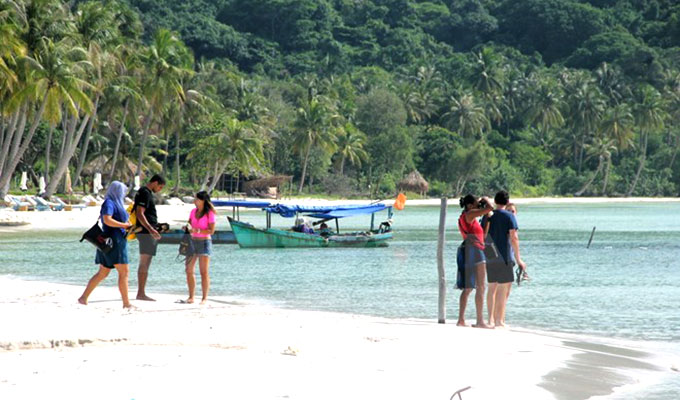The tourism and hospitality sectors are predicted to develop rapidly and attract plenty of investment, based on their strong growth in recent years, according to experts.

Bai Sao beach in Phu Quoc Island
Ngo Hoai Chung, Vice Chairman of the Viet Nam National Administration of Tourism, said tourism has been growing strongly in recent years and increased its proportion of GDP.
It accounted for 6 percent of GDP in 2016 compared to 1.76 percent in 1994, he told a seminar held on the sidelines of the Food & Hotel exhibition held in HCM City late last month.
The sector’s development has also enabled other industries to develop, he said.
Viet Nam received more than 4.2 million international visitors in the first four months of the year, a year-on-year increase of 30.3 percent.
“The tourism industry has attracted lots of investment for developing products, services and facilities, which has changed the appearance of tourism destinations and led to an increasing number of modern, high-quality hotels and services.”
The number of hotels and guest houses in Viet Nam has increased sharply in recent years, with the number of rooms going up from 69,000 in 2001 to 420,000 last year, he said.
According to Do Thi Hong Xoan, Chairwoman of the Viet Nam Hospitality Association, the kinds of accommodation are becoming increasingly diverse.
Besides hotels and motels, they now include many others such as resorts, tourist apartments and villas.
Some 45 percent of them are situated in the north, 29 percent in the central and Central Highland regions and 25 percent in the south.
Large hotels are mainly located in tourist centres and coastal areas such as Ha Noi and HCM City.
Chung said the industry expected to attract 17-20 million foreign visitors and 82 million domestic visitors by 2020, contribute more than 10 percent of the country’s GDP and generate four millions jobs.
The tourism sectors revenues were expected to reach 35 billion USD by then, he said.
“To meet those goals, the country is expected to have 580,000 rooms by 2020 and 900,000 by 2030.
“Investment in the hospitality sector is expected to continue to increase at tourism centres, especially in coastal areas, with a focus on the high-end and three- to five-star segments.”
Many investors told the seminar that they plan to open four- or five-star hotels in tourism cities this year, including HCM City, Phan Thiet, Nha Trang, and Phu Quoc.
Tran Hung Viet, General Director of Saigontourist, said: “We are planning to build some hotels in HCM City to meet the increasing demand of tourists. But since very little vacant land is available in central areas like Districts 1 and 2, Saigontourist is looking for suitable places to build hotels.”
Despite its great potential, experts said to attract more investors Viet Nam needs to further improve its policies and infrastructure and create an equal business environment for enterprises.